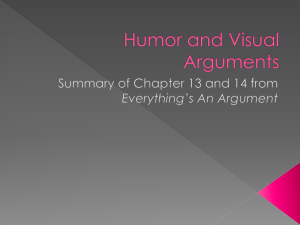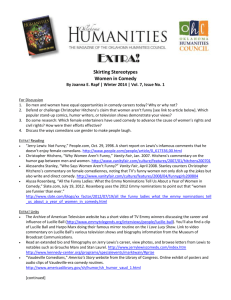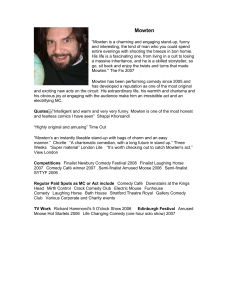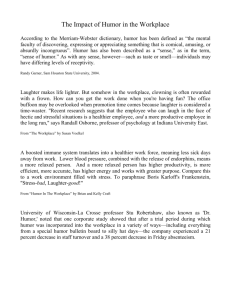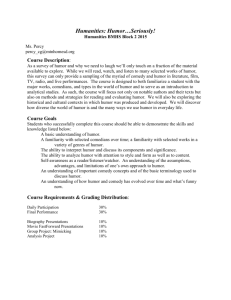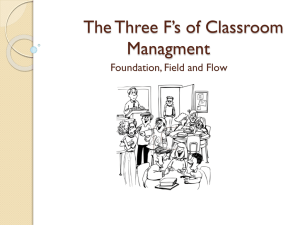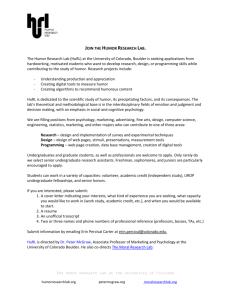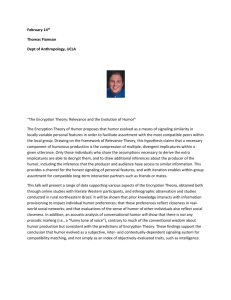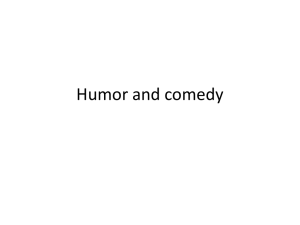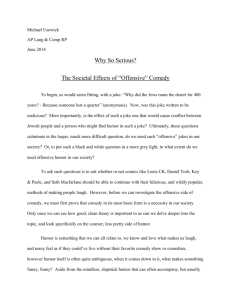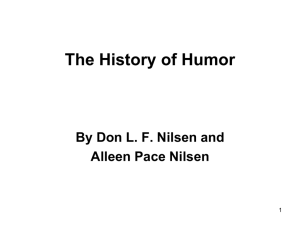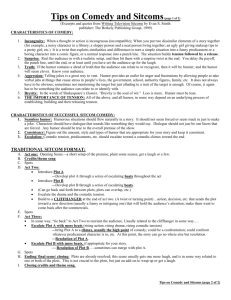untitled - Kenyon College
advertisement
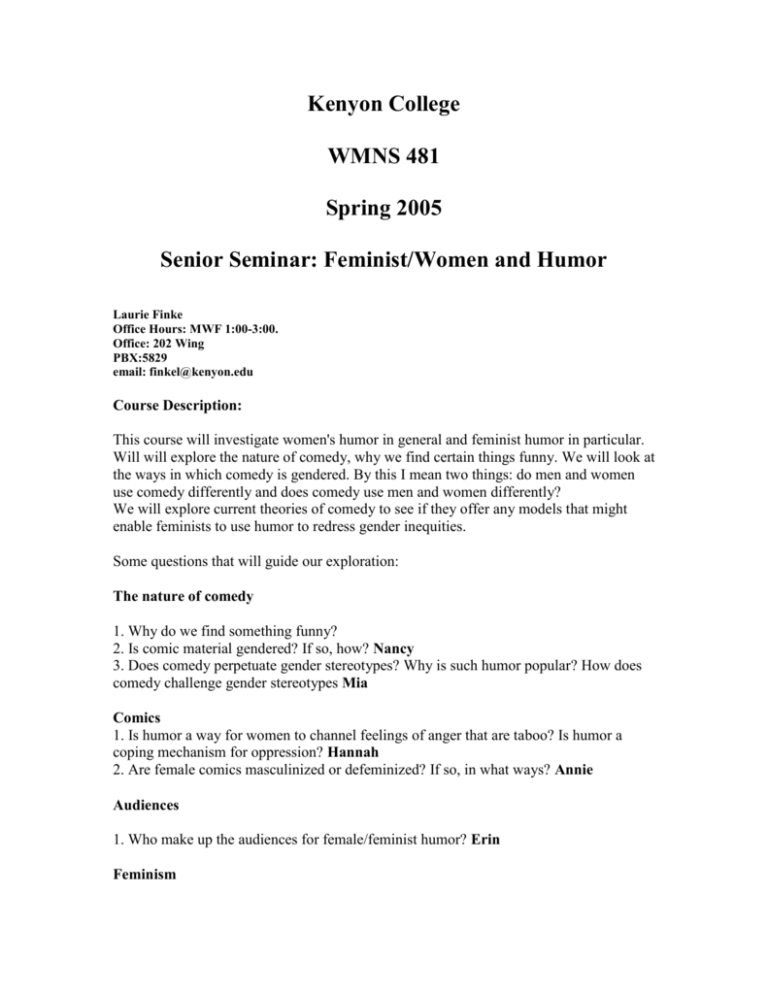
Kenyon College WMNS 481 Spring 2005 Senior Seminar: Feminist/Women and Humor Laurie Finke Office Hours: MWF 1:00-3:00. Office: 202 Wing PBX:5829 email: finkel@kenyon.edu Course Description: This course will investigate women's humor in general and feminist humor in particular. Will will explore the nature of comedy, why we find certain things funny. We will look at the ways in which comedy is gendered. By this I mean two things: do men and women use comedy differently and does comedy use men and women differently? We will explore current theories of comedy to see if they offer any models that might enable feminists to use humor to redress gender inequities. Some questions that will guide our exploration: The nature of comedy 1. Why do we find something funny? 2. Is comic material gendered? If so, how? Nancy 3. Does comedy perpetuate gender stereotypes? Why is such humor popular? How does comedy challenge gender stereotypes Mia Comics 1. Is humor a way for women to channel feelings of anger that are taboo? Is humor a coping mechanism for oppression? Hannah 2. Are female comics masculinized or defeminized? If so, in what ways? Annie Audiences 1. Who make up the audiences for female/feminist humor? Erin Feminism 1. What makes a joke feminist? Becky 2. How has humor been used as a tactic by feminists to effect social change? Does the humor make the call for social change less serious? Can it be disregarded because it's funny? Claire 3. How can we reconcile the hypersensitive and intellectual nature of feminism with humor? Caroline 4. As a part of popular culture (given the conservatism of popular culture), does humor reinforce the status quo or challenge it? Allison 5. How do women's relationships with humor (as producers and consumers of comedy) reflect their relationships to power structures? (in some ways, this question restates number 3 in feminist terms, but as Joanna pointed out, it also allows us to talk about differences among women-of race, class, ethnicity, sexuality) Joanna 6. Does women's relationship to comedy derives from the gendered nature of the split between public and private sphere? How is a comedy a public sphere activity that, at least historically, may have been closed to women because of their "proper place" in the private sphere? Liz Class Presentations--We will go in order of the questions. Each of you has only 15 minutes so that everyone will have enough time. This means you will need to be well organized and succinct. Try to use powerpoint to organize your remarks effectively. This course satisfies a requirement in the Women's and Gender Studies Concentration. Readings: Molly Ivins, Who Let the Dogs In? Regina Barreca, They Used to Call Me Snow White. . .But I Drifted Rita Mae Brown, Rubyfruit Jungle Wendy MacLeod, House of Yes Wendy MacLeod, Schoolgirl Figure Gloria Kaufman, In Stitches Diane DiMassa, Complete Hothead Paisan others as assigned Useful Web Sites: Internet Movie Database Seminar Presentation Guidelines Seminar Schedule--we meet Tuesdays from 1:10 to 4. Date Jan 18 Seminar 1 syllabus planning, Ivins, Dogs Seminar II Mean Girls, But I'm a Cheerleader Jan 25 Mean Girls, But I'm a Cheerleader They Used to Call me Snow White Feb. 1 Hothead Paisan essays as assigned Feb. 8 Assignment on Hothead due Feb. 8 House of Yes (screening) Feb. 15 Schoolgirl Figure; Wendy MacLeod Hothead revisited visit Feb. 22 In Stitches standup comedy Mar. 1 In Stitches Organizational meeting for magazine discussion; essays as assigned 5 March -20 March Spring Break Mar. 22 class presentations on questions* 15 minutes each in order Mar. 29 Apr. 5 Apr. 12 Apr. 19 Apr. 26 May 3 Evaluation Each member of the class will be responsible for preparing an answer to one of the questions above. You will present your answer as a brief (10 minutes) powerpoint presentation on March 1 just before spring break. You may work collaboratively with classmates if you prefer. This will constitute 1/2 of your grade for the course. The other half will come from your work on whatever "project" we determine to do. For help in the research process, in locating information, evaluating, making effective use of, and citing that information please consult the Five Colleges of Ohio Information Literacy Tutorial. For a discussion of the evaluative criteria used for grading papers in this course, click here. For a list of common grammatical errors, click here. See also Revising and Editing Questions How To Cite Web Sources Academic Honesty: It is the responsibility of every student to familiarize him or herself with the contents of the Student Handbook 's discussion on academic honesty. I will use these guidelines in determining if you are being dishonest and will adhere to the prescribed procedures and penalties. PLAGIARISM: What It is and How toRecognize and Avoid It. Click here Disability Statement: If you have a hidden or visible disability which may require classroom or test accommodations please see me as soon as possible during a scheduled office hour. If you have not already done so, you must register with the Coordinator of Disability Services (Erin Salva, salvae@kenyon.edu, x5145), who is the individual responsible for coordinating accommodations and services for students with disabilities. All information and documentation of disability is strictly confidential. No accommodations will be granted in this course without notification from the Office of Disability Services.
